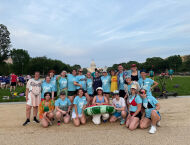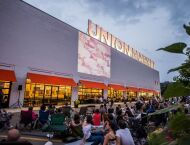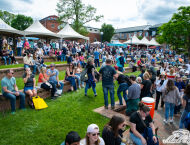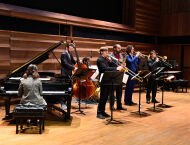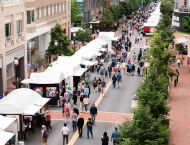Music
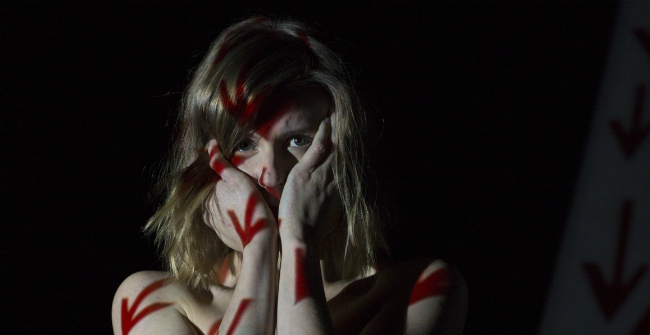 Photo: Ryan Scherb
Photo: Ryan Scherb
Amanda Gookin Discusses Forward Music Project
March 28, 2019 @ 12:00am
Classical music is not generally associated with political activism, but that’s what Amanda Gookin hopes to change with her Forward Music Project at the Dupont Underground. The project presented by National Sawdust Projects is a part of Kennedy Center’s ongoing DIRECT CURRENT programming celebrating contemporary music. Removing the stuffy connotations of classical music, Forward Music Project seeks to make the genre more accessible and use it as a force for good. Commissioning works from all-female composers, Gookin incorporates music, storytelling, chanting, staging effects and projection art to create a stimulating and immersive experience.
On Tap: Can you tell me about the Forward Music Project and how it came to be?
Amanda Gookin: At the end 2015, I started to incubate the idea of commissioning work by women for solo cello. Women are very sorely underrepresented in classical and contemporary programs, and I just wanted to do my part in helping to contribute [a] new repertoire that could get out there and be performed more often. I also started to ask myself the question of involving identity politics in music and why we don’t use classical music as a platform more often to speak out about human issues, social justice and political issues. I always felt that in music programing, we were conservative and not really taking those kinds of risks. So, as somebody who is very dedicated to social justice and women’s issues and gender issues, and those who might not fall into the binary, I wanted to give a platform for women to not only write music, but also to use it as an opportunity to share their personal story or to highlight an issue they thought was important to them.
OT: What can people expect to see at your performance at the Dupont Underground?
AG: At the Dupont Underground, I will be performing the first iteration of Forward Music Project. It’s a commission project that is ongoing. In the first year, I commissioned seven works and along with that is projection art created by Katy Tucker, who is my collaborator. I will be performing those seven pieces that were in the original show that premiered at National Sawdust in March 2017.
OT: Forward Music Project aims to use classical music as a means of political activism. What kinds of issues do you focus on on?
AG: I think the project is really centered around issues of women and girls, although it is expanding to those who engage with femininity. I would say the pieces, in one form or another, tackle issues of women or girls. Some of the women wrote stories that are very personal to them about their family heritage or being assaulted. Others shared stories that they did not relate to directly, but felt were very important to bring to the table such as sex trafficking and child marriage.
OT: In your TEDx Talk, you mentioned a lack of diversity and a sense of elitism that is present in classical music. Do you think that is changing?
AG: It’s slowly changing. I think the rate at which things are charging is very slow for where we would want to be at this point. A very low percentage of American orchestras are comprised of black and latino musicians. If we consider conductors, an even smaller percentage are people of color or women. So, it is still true that there is a very low representation of diversity in our orchestras. In my TEDx Talk, I was referring to your typical classical music audience. When you conjure an image like that, to me, I conjure an image that is primarily white and privileged. If you go to a great hall, the tickets in the front row are extremely expensive, and just by shear cost, it already signifies that only a certain type of person can sit in these rows.
OT: Your style is far from traditional. You chant, play cello, and incorporate digital elements into your performance. How did discover your unique approach?
AG: I think that was an organic process. I’d always been interested in the avante garde, and I’d always been interested in pushing boundaries. I grew up in a pretty conservative environment, and I was always considered the subversive one, even though I was wearing pearls, khaki and such. There was something edgy that needed to come out. As I started my professional career, I was lost in terms of what I wanted to do. I got into the Mannes School of Music, which is a really great conservatory in New York City. When you graduate from a conservatory, you feel like you have three tracks: you can be an orchestral musician, a teacher or a soloist. I felt like I was destined to do something really different and so I started to experiment a little bit. I saw an ad that was looking for a female violinist or a string player to compose and perform music for an all-female Romeo and Juliet production. So I responded to the ad and met with the director and they hired me. I had to figure out how to write music and how to improvise. That led to writing music for even more plays, and I just kept going. I had to create modern sounds and I was getting experimental with objects to create sounds and other percussion instruments so it wasn’t just me with the cello. I had a tambourine at my foot, a symbol next to me, I had bells, I had bottles that I would scrape.
OT: Have you ever received backlash from classical music purists about your style?
AG: Oh yeah, for sure. I really haven’t received any backlash about my style per se because there’s nothing out of the ordinary in terms of contemporary music. I’ve seen some performances that are even way beyond what I’m doing. I think from a musical standpoint I haven’t received much backlash. I have mostly received backlash about content. Some people have pushed back against classical music or any sort of performance music art classical instrument being political – that we should just perform music for music’s sake, which I think is beautiful too. I don’t always perform music that is heavy handed in social justice, but when I’m very outspoken about it, that’s when some people start to get uncomfortable.
OT: What do you want your audience to take away from this project?
AG: Well, everyone is different and I feel like this conjures a wide range of emotional responses. It depends on how the person is entering into the performance. If it’s somebody who identifies with some of the content of the pieces, I hope that it’s a hand that reaches out and says, “I hear you and I’m here for you. You’re heard and understood. This is a safe space.” If it’s somebody who is super into feminist ideology, I hope they would feel even more empowered to go forward and do more good work. For somebody who may be skeptical, I would hope that they would at least have an open mind and hear the music and maybe begin to think about things they hadn’t considered before. I feel a lot of my project is about planting seeds. While I do receive a lot of great feedback in the moment, I do hope that it has a longer-lasting effect on the listeners.
Check out Amanda Gookin’s Forward Music Project at Dupont Underground on March 29 at 9 p.m. Tickets are $20 and available here. Learn more about Forward Music Project here.
Dupont Underground: 19 Dupont Cir NW, DC; 202-846-1474; www.dupontunderground.org


